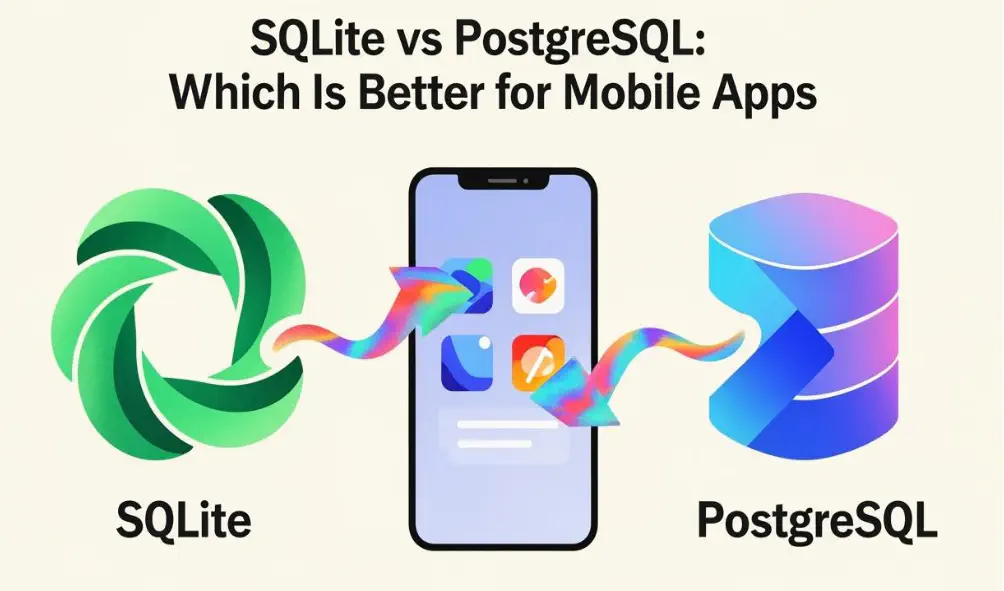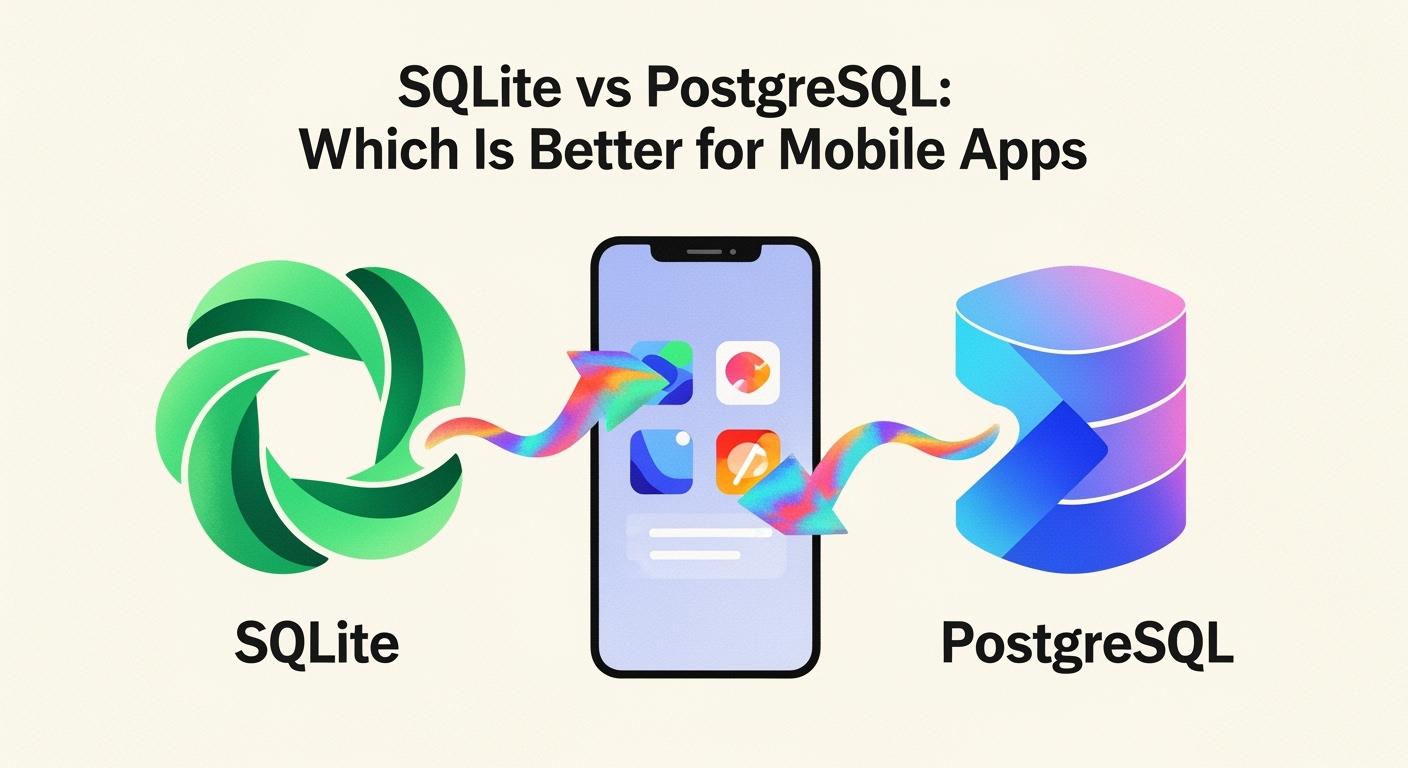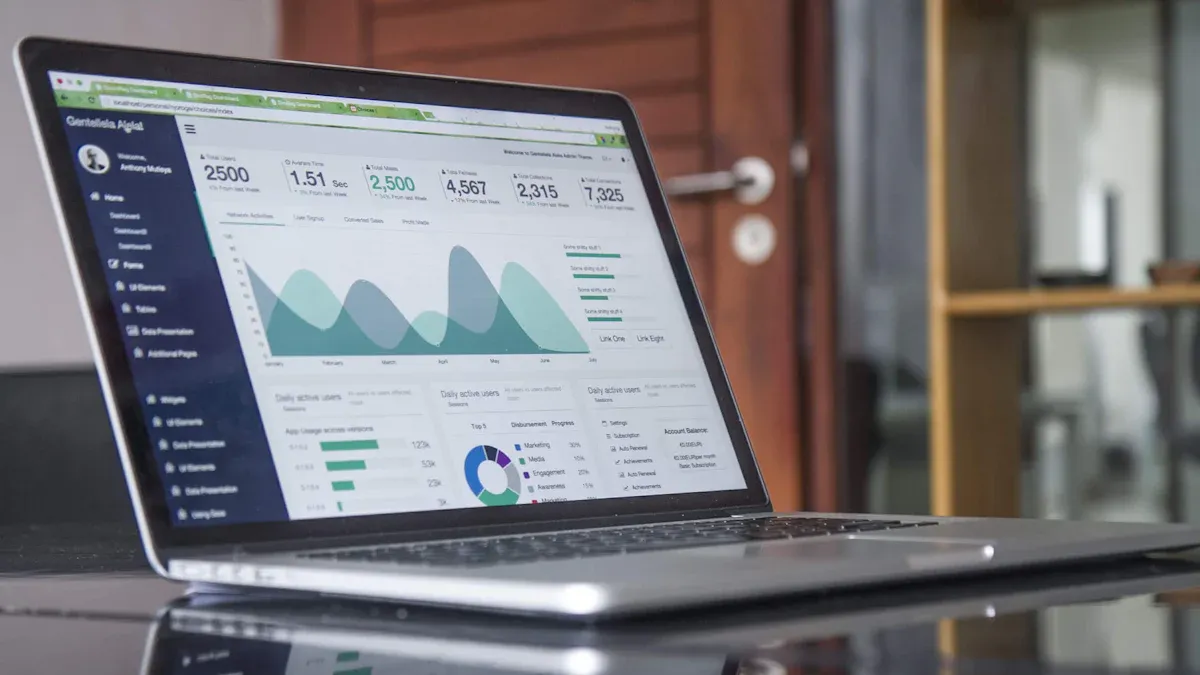SQLite vs PostgreSQL Which Is Better for Mobile Apps



Explore the differences between SQLite and PostgreSQL for mobile apps.
| Features | SQLite | PostgreSQL |
|---|---|---|
| Supported Data Types | Basic support (TEXT, INTEGER, BLOB, etc.). | Offers a diverse variety of data types, including custom types. |
| Indexing | Supports indexes for faster data retrieval. | Uses advanced indexing techniques for efficient query performance. |
| Transaction Support | Provides ACID compliance for data integrity. | Adheres to ACID principles for strong data integrity and reliability. |
| Architecture | Embedded, serverless, runs in the app process. | Client-server model, runs as a separate process. |
| Resource Usage | Uses very little memory and CPU. | Needs more memory and CPU. |
| Setup | No setup needed, works out of the box. | Needs installation and configuration. |
| Offline Support | Built-in offline support. | Needs extra tools for offline use. |
| Scalability | Best for small to medium apps with simple needs. | Handles large, complex, and high-traffic apps. |
When you make a mobile app, picking the right database is important. It affects how your app works and grows. Many developers like SQLite for mobile apps because it does not need setup, works fast, and keeps data on the device. Experts say SQLite is easy to use and helps mobile development. However, if you need more advanced features or want to scale up, SQLite PostgreSQL is often considered. People often compare SQLite PostgreSQL because they impact app speed, data sync, and overall user satisfaction.

Image Source: unsplash
You might want to know how SQLite and PostgreSQL compare. The table below shows important features for mobile app databases.
| Feature | PostgreSQL | SQLite |
|---|---|---|
| Supported Data Types | Offers a diverse variety of data types, including custom types. | Basic support (TEXT, INTEGER, BLOB, etc.). |
| Indexing | Uses advanced indexing techniques for efficient query performance. | Supports indexes for faster data retrieval. |
| Transaction Support | Adheres to ACID principles for strong data integrity and reliability. | Provides ACID compliance for data integrity. |
| Architecture | Client-server model, runs as a separate process. | Embedded, serverless, runs in the app process. |
| Resource Usage | Needs more memory and CPU. | Uses very little memory and CPU. |
| Setup | Needs installation and configuration. | No setup needed, works out of the box. |
| Offline Support | Needs extra tools for offline use. | Built-in offline support. |
| Scalability | Handles large, complex, and high-traffic apps. | Best for small to medium apps with simple needs. |
Tip: Look at this table to help you pick the right database for your app.
When you look at SQLite and PostgreSQL, you see they work in different ways.
Architecture: SQLite is inside your app. You do not need a server. PostgreSQL is a server. You connect to it over a network.
Data Types: PostgreSQL has many data types. You can make your own types too. SQLite uses basic types like text and numbers.
Indexing: PostgreSQL has advanced indexing. This helps you find data fast in big databases. SQLite has simple indexes.
Transactions: Both keep your data safe with ACID support. This means your data will not get lost or mixed up.
Resource Usage: SQLite uses less memory and CPU. Your app stays fast. PostgreSQL needs more resources but can do bigger jobs.
Setup and Maintenance: SQLite works right away. No setup is needed. PostgreSQL needs you to install and manage a server.
Offline Support: SQLite works offline by default. PostgreSQL needs extra steps for offline use.
Scalability: PostgreSQL is great when your app gets bigger. It handles lots of users and complex data. SQLite is best for smaller apps or simple storage.
Think about what your app really needs. If you want something simple and quick, SQLite could be best. If your app needs to handle many users or complex data, PostgreSQL might be better.
SQLite is good for mobile apps because it is small and easy to use. You do not need a server for it. This makes your work faster and simpler. SQLite works on Android, iOS, and other systems. You do not pay any license fees. This helps if you have a small budget.
Here are reasons why developers pick SQLite for mobile apps:
Your app uses less memory and storage.
Reading data is fast, even with many users.
You can use SQLite offline without internet.
It is stable and reliable, so your app runs well.
You can add SQLite to your app easily.
Tip: If you want a database that is simple and quick, SQLite is a good choice for mobile apps.
| Feature | SQLite | PostgreSQL |
|---|---|---|
| Server Model | No server needed | Needs a server |
| Setup Complexity | Easy and simple | Harder to set up |
| Ideal Use Case | Small projects | Big applications |
| Integration | Easy in mobile apps | Needs more setup |
SQLite has some limits you should know. It works best for apps with one user or not many users at once. Only one person can write data at a time. If many users try to write, the app may slow down or show errors. This is not good for busy apps or apps with lots of data.
When you compare SQLite PostgreSQL, SQLite is not great for apps with lots of users or hard queries. If your app needs to handle many users or complex data, you should think about other choices.
Note: SQLite lets many people read at once, but only one can write. This can make writing slow in busy apps.
PostgreSQL uses a client-server setup. Your app talks to a separate database server. Many users can use the app at the same time. The server gives each user their own process. This helps the app work well, even with lots of people.
PostgreSQL lets many people use it at once. It uses Multi-Version Concurrency Control (MVCC). This means users can read and write at the same time. They do not slow each other down. Your app can do more things at once. This is good for busy or growing apps.
PostgreSQL has many advanced features. You can run hard queries and use special data types. The database works with JSON, arrays, and full-text search. You can also make your own data types and functions. These tools help you build strong mobile app backends.
Here is a table that lists some advanced features and what they do:
| Feature | Benefit |
|---|---|
| Performance | Fast data searches with indexing and full-text search |
| Scalability | MVCC and replication help your app grow |
| Security | SSL and role-based access keep data safe |
| Extensibility | Make custom data types and functions |
| Advanced Data Types | Use JSON, XML, arrays, and full-text search |
PostgreSQL is free to use. It follows SQL rules and keeps your data safe with ACID compliance.
PostgreSQL is harder to set up for mobile apps. It does not run inside your app like SQLite. You must install and manage a server. PostgreSQL uses more memory and CPU. This can be tough for small devices or simple apps.
If you compare SQLite PostgreSQL, PostgreSQL is better for complex data, many users, or advanced syncing. For simple or offline apps, SQLite is easier to use.

Image Source: pexels
You want your app to be fast. SQLite is good for simple reading and one user at a time. It is often faster for these jobs because it uses files. If you save many things at once, SQLite can do it quickly. PostgreSQL is also fast, but it is better for hard questions or many users. For most mobile apps, SQLite feels faster for easy jobs.
Phones and tablets have little memory and battery. SQLite uses very little memory and power. It works well on small devices. You do not need extra servers. PostgreSQL needs more memory and power. It runs as a server, so it uses more battery. This may not be good for small devices.
Many apps need to work without the internet. SQLite is great for this. It keeps data on the device. Your app can read and write anytime. You do not need a server or internet. PostgreSQL is not made for offline use. It works best when your app is always online.
If your app gets bigger, you may need to handle more users. SQLite is best for one user and quick reads. PostgreSQL is better for many users and hard data jobs. It has smart ways to find data and can hold lots of data. For big apps, PostgreSQL helps you grow and sync data.
You want setup to be easy and care to be simple. SQLite is easy to add to your app. It needs almost no care, just clean up sometimes. Backups are simple. PostgreSQL needs more work. You must take care of the server and check how it runs. Many people know SQL, so both are easy to use. Often, apps use SQLite for local data and PostgreSQL for cloud data.
You want your mobile app to work well and save data easily. SQLite is great when you need simple and safe storage on the device. Many developers pick SQLite if they do not want a server or a hard setup. Use SQLite if your app keeps data on the phone and does not need to handle lots of users at once.
Here are some times when SQLite is a good choice:
Note-taking apps save your ideas and lists on your phone.
Task apps help you keep track of your to-dos.
Some apps store things like contacts or settings on your device.
Apps use caching to help load things faster.
Some apps work offline, so you can use them without internet.
Tip: If your app must work when there is no internet, SQLite gives strong offline help.
Many popular apps use SQLite to make things better for users. The table below shows some real examples:
| App Name | Functionality Description |
|---|---|
| Messages wait offline and send when internet comes back. | |
| Google Docs | Lets you edit offline and syncs changes later. |
| Spotify | Lets you download playlists to listen without internet. |
| Airbnb | Shows booking details even when you are offline. |
Pick SQLite if your app needs to:
Save data on the device for fast use.
Let people use the app with no internet.
Handle simple data with not too many users.
Be fast and not use much memory or battery.
SQLite helps you make apps that are easy, quick to set up, and work well for daily use. If your app needs these things, SQLite is probably the best pick.
You may ask when PostgreSQL is right for your app. PostgreSQL is best if your app needs to handle lots of data or many users. It is good for apps that need to sync data between devices and servers. Pick PostgreSQL if your app must organize lots of information fast.
Here are times when PostgreSQL is a strong choice:
Your app keeps millions of records.
Many users read and write at the same time.
Your app needs advanced search or special data types.
You want strong security for important information.
Your app syncs data with a main server.
Apps that need to do many things at once use PostgreSQL. Instagram uses PostgreSQL for billions of photos and accounts. Spotify uses it to keep music playing without stopping. Uber uses PostgreSQL to track trips and places with maps.
Tip: If your app needs to grow and handle lots of users, PostgreSQL helps you do that.
See how PostgreSQL works for different projects:
| Project Type | Why PostgreSQL Works Well |
|---|---|
| Social media apps | Handles many users and lots of posts |
| Music streaming platforms | Manages quick transactions and playlists |
| Ride-sharing services | Tracks trips and places accurately |
| Enterprise software | Supports hard business rules |
| Simple web apps | Gives easy and safe data access |
If your app needs strong features and can grow bigger, PostgreSQL is a smart pick. You get safety, flexibility, and support for hard data jobs in one tool.
You want to pick the best database for your mobile app. The right choice depends on what your app needs. It also depends on how much data you have. Think about how people will use your app. This guide can help you choose the right database.
First, look at the main ways SQLite and PostgreSQL are different. The table below shows which database works best for different projects:
| Feature | SQLite | PostgreSQL |
|---|---|---|
| Ideal for | Small-scale applications, mobile apps | Large-scale applications, enterprise apps |
| Data handling | Lightweight, file-based storage | Complex queries, high concurrency |
| Setup complexity | Minimal setup required | Requires server setup |
| Performance | Fast for single-user applications | Optimized for multi-user environments |
| Security features | Basic file permissions | Advanced role-based access control |
Think about what kind of data your app will use. Also, think about how people will use your app. If your app saves simple data and works offline, SQLite is a good pick. If your app needs to help many users at once or do hard searches, PostgreSQL may be better.
Here are some important things to help you decide:
Data Structure: Does your app save simple lists or more complex data?
Data Size: Will your app have a little data or lots of records?
Speed and Scale: Will one person use the app, or many at once?
Data Modeling: Does your app need special data types or custom functions?
Data Security: Is it important to control who can see or change data?
Caching: Will your app work better if it saves data on the device?
You can use this checklist to see what your app needs:
Your app works offline and saves data on the device.
You want setup to be fast and easy.
Your app has simple data and not many users at once.
You need something light for mobile devices.
If most of these are true, SQLite is probably the best choice.
If your app needs to:
Help many users at the same time.
Do hard searches or use special data types.
Sync lots of data with a server.
Need strong security and user controls.
Then PostgreSQL might be better for you.
Tip: Always think about how your app could grow. Pick what you need now, but plan for changes later.
The table below matches common mobile app needs to the best database:
| Requirement | Best Choice | Why |
|---|---|---|
| Offline-first functionality | SQLite | Works without internet, stores data locally |
| High user concurrency | PostgreSQL | Handles many users at once |
| Simple data storage | SQLite | Easy setup, fast for small data |
| Complex queries | PostgreSQL | Supports advanced search and data modeling |
| Strong security | PostgreSQL | Advanced access control and user management |
When you compare SQLite and PostgreSQL, you see each one is good for different things in mobile apps. Use the tables and checklist above to help you choose. This way, you can pick the right database and make your app better for users.
You now know that SQLite works best for most mobile apps because it is simple, fast, and easy to set up. PostgreSQL fits apps with complex data or many users. Some apps, like social media or e-commerce, have special needs. You should always match your database to your app’s data, user base, and offline needs.
Remember: Each app is unique. Review your app’s size, security, and sync needs before you decide.
Want to learn more?
Scalability, speed, and security matter for your database.
Offline support and easy integration help your app succeed.
Real-time sync and data consistency keep users happy.
Check costs and technical specs.
Look for strong community support.
Review licensing and integration options.
SQLite lets your app work without internet. It saves data right on the device. PostgreSQL needs a server and internet to work. So, it cannot run offline by itself.
PostgreSQL can help many users at once. It uses a client-server setup for this. SQLite is best for one user or just a few users.
SQLite is simple to start using. You do not need a server or extra steps. PostgreSQL needs you to install and set up a server first.
SQLite is faster for easy reads and writes. It uses less memory and runs inside your app. PostgreSQL is better if you have hard questions or lots of data.
Yes, you can use both in your app. Many apps save local data with SQLite. They also sync with a PostgreSQL server for cloud features. This way, you get offline use and strong online tools.
SQLFlash is your AI-powered SQL Optimization Partner.
Based on AI models, we accurately identify SQL performance bottlenecks and optimize query performance, freeing you from the cumbersome SQL tuning process so you can fully focus on developing and implementing business logic.
Join us and experience the power of SQLFlash today!.